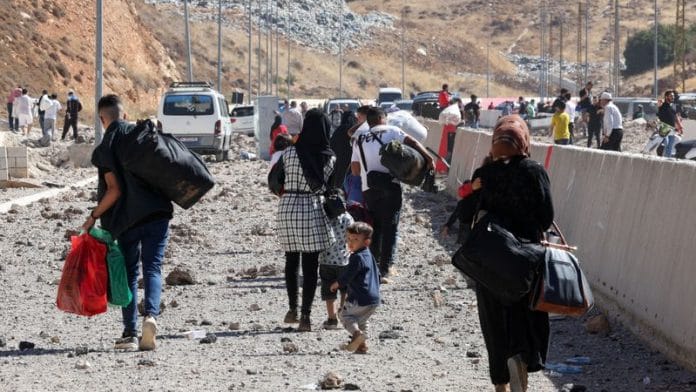After Israel’s ground invasion of Lebanon, assassinations of top leaders of the armed militia active in the region – including Ismail Haniyeh of Hamas in Tehran and Hassan Nasrallah of Hezbollah in Beirut – and a year-long assault on Gaza, Iran’s recent response has brought the Middle East to the precipice of a direct conflagration.
After months of setbacks, Iran launched multiple missiles at Israel’s military bases on Tuesday, which was more successful than its first attack in April 2024 following Israeli bombing of the Iranian embassy in Damascus, Syria. The use of its more powerful hypersonic ballistic missiles such as Fattah-1 indicates a major escalation.
With Israel vowing retaliation, the two countries have their armed forces on the banks of the Rubicon, waiting for the other to cross the river, which would make armed conflict inevitable. That is why the current situation in Middle East is ThePrint’s Newsmaker of the Week.
Iran’s loneliness, economic malaise
Apart from the three H – Hamas in Gaza, Hezbollah in Lebanon, and the Houthis in Yemen – Iran has few friends in the region. Since the Camp David Accords, signed between Israel and Egypt in 1979, Tel Aviv has been able to normalise ties with Jordan (1994), Morocco, Sudan, the UAE, and Bahrain in recent years.
A possible normalisation of ties between Saudi Arabia and Israel would change the dynamic in the region, especially as the Saudi King is also the Custodian of the Two Holy Mosques – Mecca and Medina – the holiest sites in Islam. While the bombings in Gaza have upended this possibility, ties between the Gulf countries and Iran are nevertheless frosty at best.
Between 2015 and 2023, Saudi Arabia and Iran were involved in a proxy war in Yemen, where Riyadh supported the government forces while Tehran aided the rebel Houthis. China brokered a rapprochement deal between Riyadh and Tehran, which saw a resumption in ties after a seven year rough patch.
In recent years, however, Iran has found support from Russia, China and the Democratic People’s Republic of Korea, especially after Moscow’s war in Ukraine. Tehran and Pyongyang have aided Russian war efforts in Eastern Europe, while Beijing has supported Moscow with machine tools and other parts.
In return, there are reports that Russia would aid Iran in its missile programme. However, this partnership is still in its nascent stage.
But Tehran has another major issue – its economy. While Iran’s GDP touched 5 per cent between April and December 2023, the country faces employment challenges, with only about 41.3 per cent of its working age population engaged in employment, according to the World Bank.
During the 2023-2024 period, Tehran was able to collect only 73 per cent of its budgetary revenue target, leading to reprioritisation of expenditure, which makes any conflict potentially costly to a country with a difficult economic situation.
All this points to why Tehran has been mute in its original response to Israel’s actions in degrading both Hezbollah and Hamas’ capabilities and has at multiple times offered Tel Aviv an off-ramp from further escalation.
However, the elimination of Hezbollah’s leadership required a response and it did, prompting the war hawks in the US to call for escalation. Benjamin Netanyahu, the Israeli Prime Minister has vowed retaliation.
It’s complicated
The complicated history between Iran and Israel has seen eras of cooperation, especially in the 1950s and 1960s due to the perceived “threat” of Iraq to both their interests. The two countries have never had a direct conflict. However, this changed with the Islamic Revolution of 1979 and the subsequent regime change in Tehran.
In the early days of Ayatollah Ruhollah Khomeini’s tenure as the Supreme Leader of Iran, Israel supported the new regime with clandestine sales of weapon parts during Iran’s war with Saddam Hussein-led Iraq. Furthermore, it is said that Iranian intelligence aided Israel in destroying Baghdad’s nuclear reactor – Osirak – in 1981.
However, with the end of the Cold War, the fall of the Soviet Union, and the defeat of Iraq during the Gulf War led to Tehran, which until then was a peripheral problem for Tel Aviv, to become its central enemy.
At the same time, Iran had been cultivating different militias in the region, especially Hezbollah in Lebanon – a Shi’ite group – which was formed after Israel’s invasion of Lebanon in 1982. Similarly, after the formation of Hamas and the first intifada in the late 1980s, Iran extended its support to the Palestinian resistance groups, eventually forming the “Axis of Resistance”.
With the start of the new millennium, Iran’s geostrategic loneliness led it to continue funding and supporting these proxy groups, but it did not lead to an all-out war with Israel. Tel Aviv’s main weapons remained assassinations, subterfuge and cyber-attacks, which undermined Iran’s most consequential security endeavour – its nuclear programme.
However, the situation today is different. The two partners-turned-enemies could soon be engaged in an all-out war.
During a rare public sermon—the first in almost half a decade—the Supreme Leader of Iran on Friday warned Israel against retaliation, while US President Joe Biden sent the oil markets into a tizzy with his offhand remark that the US is in discussion with Israel about its planned retaliation against Tehran, aiming to strike at its vast oil fields.
If such an escalation occurs, it would call for further escalation from Iran, perpetuating a cycle of violence. President Biden has attempted to push a ceasefire plan between Hamas and Israel, but for various reasons, it remains stalled. Meanwhile, the Lebanese government announced that Hassan Nasrallah agreed to a 21-day ceasefire the day before he was assassinated.
Where the opportunity for peace lies is anyone’s guess, but the situation in the Middle East will continue to have global ramifications.
(Edited by Prashant)






